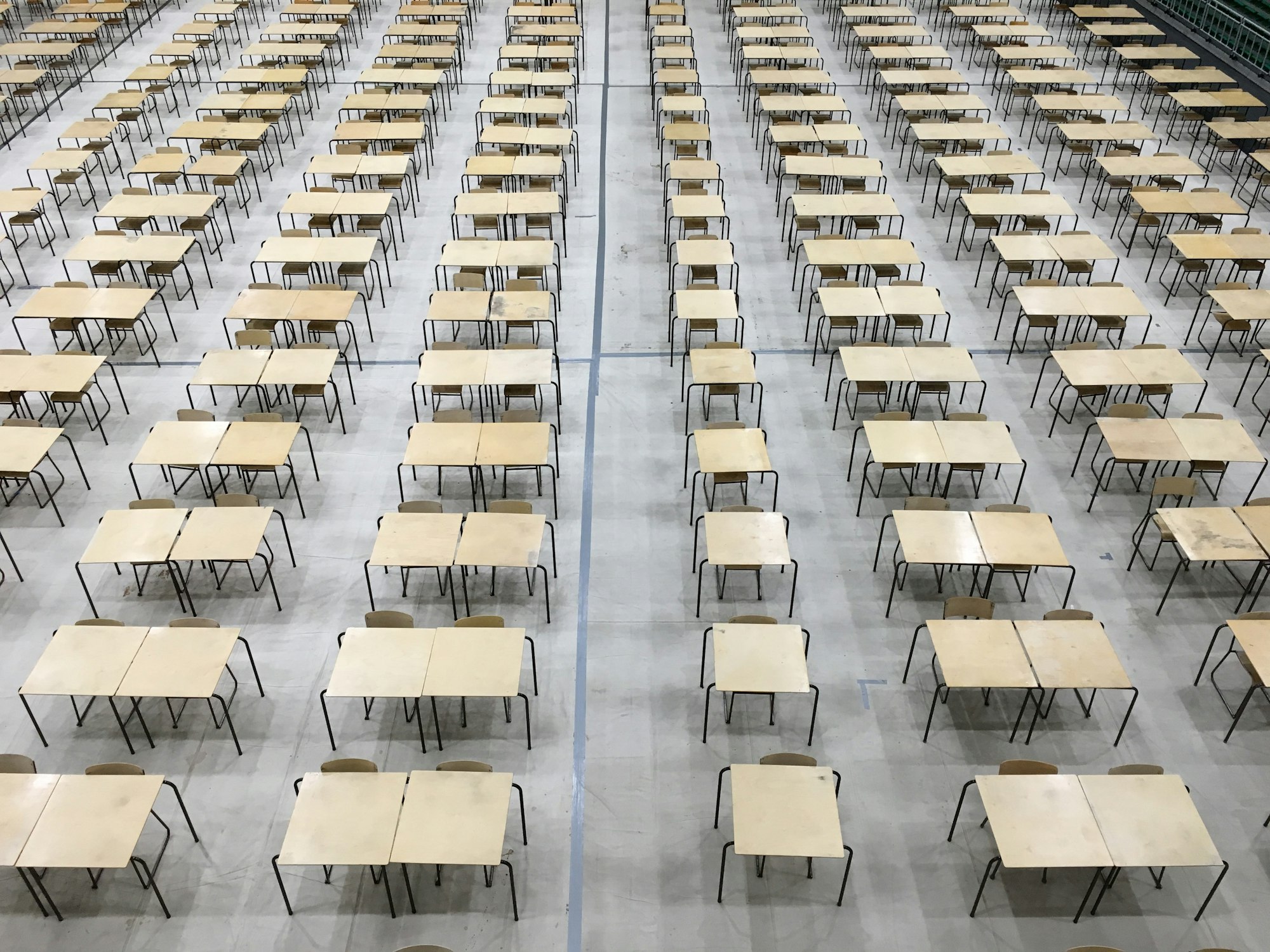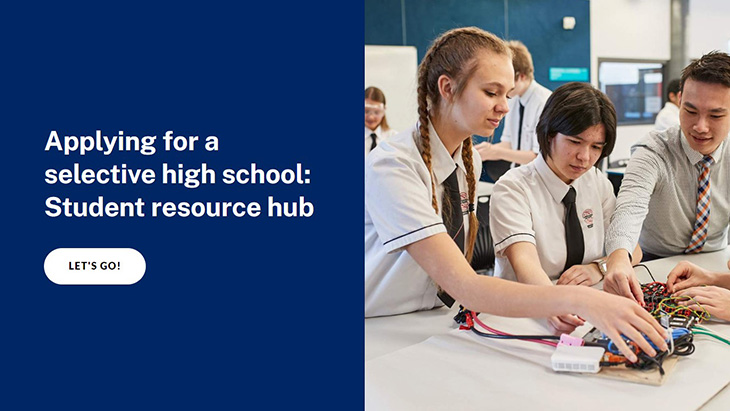What is a Selective School?
In New South Wales, a selective school is a High School that offers a specialized and academically rigorous education program. These schools admit students based on their academic merit and performance on a standardized test known as the Selective test.
Why join a Selective School?
Selective schools are part of the public education system and are managed by the NSW Department of Education. They aim to provide a challenging learning environment for academically gifted and motivated students.
By grouping academically gifted students together, the students get to learn with classmates who have similar abilities. This allows their teachers to use special teaching methods to move students through the curriculum at a faster pace and in more depth.
When learning alongside other high potential and gifted classmates, students benefit both academically and socially.
The NSW Selective Test
The selective test is made up of 4 sections; Reading, Mathematical Reasoning, Thinking Skills, and Writing. Students will pick the selective schools they would like to attend and if their scores across these four sections are high enough, they will be able to enrol in that school. There is no specific cut-off score but rather the schools will fill up until their capacity for that year has been reached.
Upcoming changes
In 2025 the testing will move to being computer-based. Those students sitting the test this year (2024) for highschool entry next year (2025) will still sit the paper version. More news regarding the 2025 structure will be released by the end of 2024.
What will be tested and how?
Each of the four sections aims to test a different skill set, however, they all require quick thinking, time management and high cognitive ability.
What are each of the sections about?
Reading Test
The reading test examines the student's comprehension skills. The student will have to answer 30 multiple-choice questions based on a reading sample booklet provided. These samples can be from any genre such as non-fiction, fiction, poetry, magazine articles, or reports. They will have 40 minutes to read the given texts and answer the 30 questions.
Mathematical Reasoning
This exam will test the student’s ability to use mathematical reasoning and knowledge to solve math problems. There are 35 multi-choice questions across 40 minutes. Students are not allowed to use calculators during this section (or any other section) of the test.
Thinking Skills
There is no prior knowledge required for this section of the test, it is here to test the students' critical thinking and problem-solving abilities to unique and obscure questions. There are 40 multi-choice questions across 40 minutes. This is arguably the most time-pressured section of the test so working quickly and efficiently is key.

Writing
For writing, students will be given 30 minutes to write a written response to a stimulus given to them in the exam room. This is designed to assess the creativity of the student's ideas and their ability to write effectively for a purpose and audience. This section will also test grammar, punctuation, spelling, and vocabulary. The students’ response must address the given topic, otherwise it will be marked lower, regardless of the actual quality of the writing.

How to prepare for the exam
For all sections of the exam, there are practice tests available on the government of NSW’s website.

In the months leading up to the exam, it is crucial to sit these practice tests and be prepared for what you are going to face. Make sure to sit them under timed test conditions. Once a test has been completed make sure to mark it using the solutions found on the same website. If you find yourself struggling to understand the solutions or to complete the practice tests, getting a tutor to walk you through them can be game-changing.
But aside from just sitting the practice tests, here are some other tips for each section:
Reading
Spend time reading from a variety of sources every night. It doesn’t have to be long, just 20 minutes before bed is enough. Not only is this fantastic practice, it is also good sleep hygiene that helps a young developing brain get the rest it needs. Much better than a bright screen!
Maths
Practice, practice, practice! Make sure that basic skills (simple algebra, times tables, mental arithmetic) are rock solid, remember, no calculators are allowed. Time is of the essence so having these skills allows more time to actually ponder the questions. Zetamac is a useful website for practicing your mental arithmetic.
Thinking Skills
The real trick to this section is reading and understanding the question quickly, therefore some good practice can be things like brain teasers and riddles. Just a few of these a day can go a long way to improving critical thinking skills and performance in this section.
Writing
The best way to improve your writing is by writing. Make sure to focus on quality over quantity. That means being creative, using fluent and complex language, and having a clear structure. You can practice by writing about your day/week in a journal. It’s also important to get the little things right like grammar, spelling, and handwriting. There’s no point using fancy words if they are spelt incorrectly.
It can also be helpful to have someone assess your practice writing pieces. Unlike the other sections, there aren’t strict solutions to the practice of writing tests. Getting a tutor to read through your work and offer feedback could be the difference between high and low scores in this section of the test.
On the day
When actually sitting the test there’s a few things to remember.
Speed. The test is fast paced, so don’t get bogged down on overly difficult questions. If you find yourself spending several minutes on one question just move on and come back to it later.
Accuracy. A correct answer found slowly is worth much more than a bunch of incorrect answers found quickly. Whilst it's not important to get bogged down, it’s also important not to rush. While taking practice tests make sure to work on time management as this is crucial to success.
Nerves. Tests can be nerve-wrecking. When you are sitting waiting to start, take deep breaths and focus on what is in front of you. When taking a question, focus on the question itself and how you will answer it. Try not to overthink or worry about things that are out of your control.
Above all else, just give it your best shot!
FAQs
What to bring on the day of the Selective Test?
All students require:
- Two 2B pencils
- An eraser
- A pencil sharpener
- A printed copy of the Test Authority letter
- A clear bottle of water
- A packed lunch to eat during the long break in the middle of the day.
- Your school uniform – make sure to remember a hat for any breaks and a jumper if the weather is cold.
If required, bring:
- Any items approved as adjustments for disability, e.g. FM transmitters
- EpiPen, asthma inhalers, diabetes or other medication
- Glasses
- Tissues
- A clear plastic bag for stationery (pencil cases are not allowed)
- A wristwatch (that cannot make a noise, calculate, compute, connect to the internet, send or receive messages, or facilitate attempted malpractice).
How difficult is the Selective test?
The test is designed to be challenging for all students. There will likely be questions you come across that you feel you cannot answer quickly or at all. If this is the case, don’t sweat it, just give the question a reasonable attempt and move on to the next.
When is the Selective Test for 2025 School Admission?
For Year 7 entry in 2025 the test occurs on the 9th of May 2024.

Want more personalized study guidance to help drastically improve your marks? A private tutor can make the biggest difference!
Written by KIS Academics Tutor for ATAR Mathematics Methods and Year 1-10 Maths, Pearson Chambel. Pearson is currently studying Actuarial Science and Pure Maths at the University of Melbourne. You can view Pearson’s profile here and request him as a tutor.








